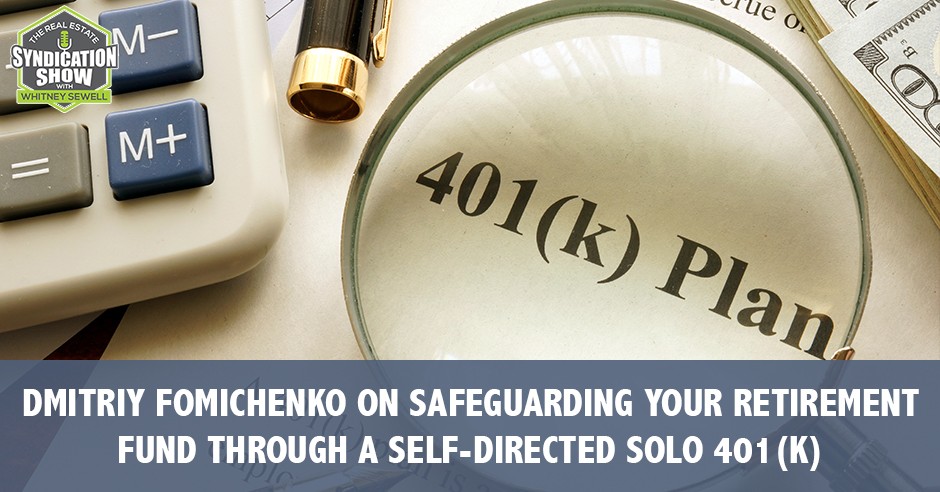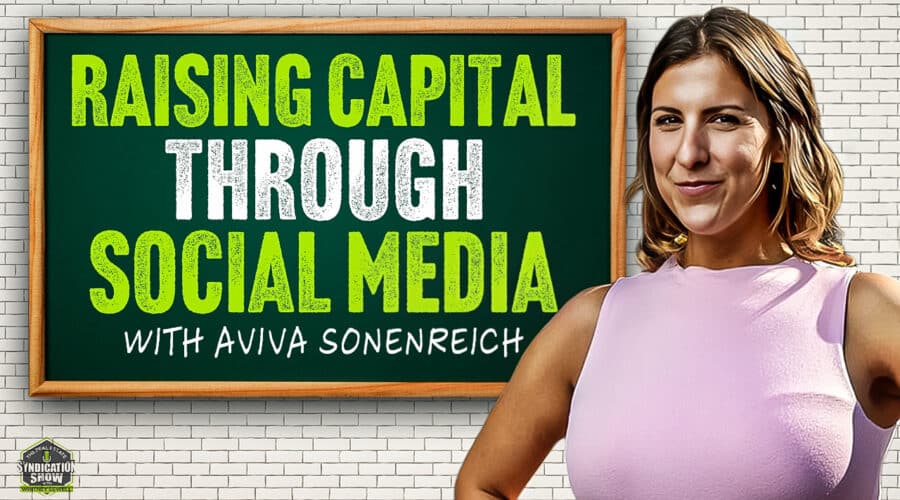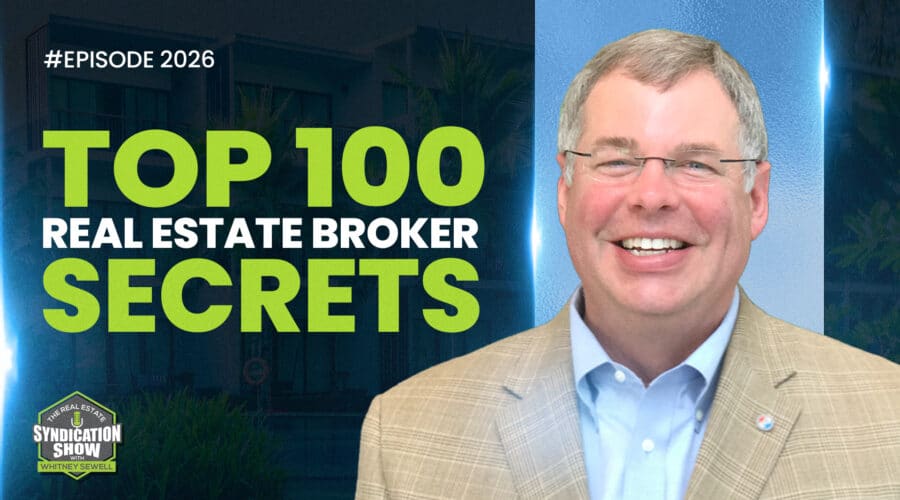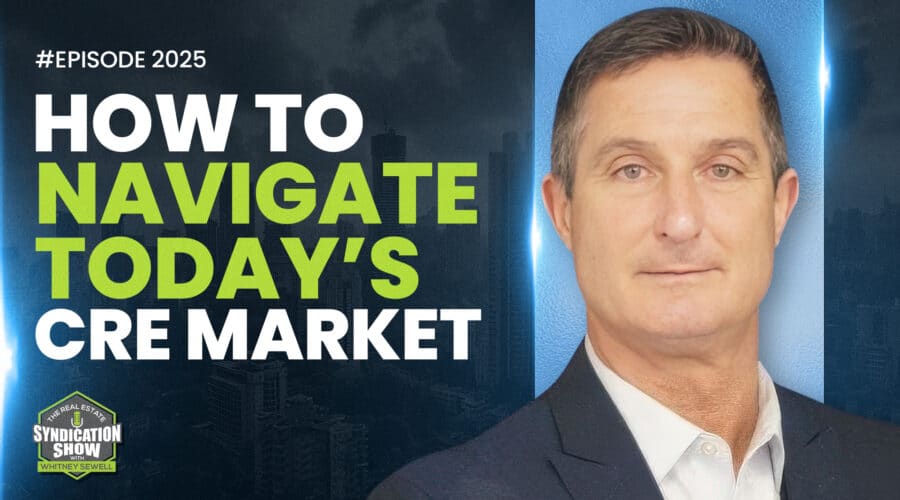Listen to the podcast here:
Dmitriy Fomichenko, real estate investor and President of Sense Financial Services, LLC, teaches us how to shelter hundreds of thousands of dollars from retirement funds or income from taxes through the self-directed solo 401(k). He talks about the pros and cons of checkbook control, the impact of having a custodian, and not simply having a solo 401(k). Dmitriy then briefly gives some points on how he helps families achieve financial freedom, highlighting the importance of setting goals and planning, being debt-free, saving for the future, and diversification.
—
Watch the episode here:
Dmitriy Fomichenko on Safeguarding Your Retirement Fund Through Self-Directed Solo 401(k)
Our guest is Dmitriy Fomichenko. Tell the audience a little more about who you are and we will jump right into it.
Thanks for having me on the show. I’m a real estate investor. I started a while back and I’ve done some things. I’ve invested in single-family rentals. I’ve done a few fixer-uppers. I’ve dealt with HUD foreclosures and then I transitioned into private lending. I also transitioned in multifamily syndication.
I’m going to tell them a little bit more about who you are as well as your business. You’re the Founder and the President of Sense Financial Services LLC, a boutique financial arm specializing in self-directed retirement accounts with checkbook control. You mentioned you have invested in numerous syndications and you own multiple investment properties. I want us to get into that and we will learn a little bit more about your background. You’re also passionate about helping families and individuals achieve financial freedom by following proven Biblical principles of financial planning and investing. I look forward to hearing about that as well. Your focus is on self-directed retirement accounts with checkbook control. Elaborate on what that is a little bit and let’s get right into the difference between self-directed IRA, Solo 401(k) and why that’s important.
Most people are probably familiar with self-directed IRA. It is an account held by the custodian that allows alternative investment options such as private lending, real estate or multifamily syndication for that matter. My niche is checkbook control. Many investors that I come across don’t want to have the middle man between their investments and them making those investment decisions. They opt for a checkbook control and that’s our niche. We help people obtain checkbook control. With an IRA, it’s possible by creating a checkbook IRA, which allows a client to bypass the custodian. With the Solo 401(k), it’s a qualified retirement account that is designed for self-employed people or on small business. There’s no requirement for a custodian as well. The custodian is completely removed out of the picture without the added benefits that it gives.
Are there any cons to having the checkbook control? You said we try to opt into that, but is there any negatives to doing it that way?
[bctt tweet=”With a solo 401(k) you can simply write the check and seal the deal immediately.” via=”no”]
The first thing that you need to be aware of is that you have the control. There is no middle man. There is no custodian. Having a custodian, if you’re about to commit a prohibited transaction and the custodian sees that, they will stop it from happening. It seems that there is no custodian in the middle, so you are responsible. The key is this. You’re responsible for your investment decisions regardless of whether you have a custodian or not. Having custodian can be beneficial by stopping prohibited transactions but oftentimes, they don’t know that you’re making a prohibited transaction.
You say a lot of times the custodian don’t know that you’re making a prohibited transaction even though you have a custodian.
I’ve seen that happen. I’ve seen clients who had IRAs with a custodian and they made prohibited transactions and the custodian was not aware of that. Having a custodian will not stop a prohibited transaction. Ultimately, it is your responsibility to understand the rules and to follow the rules.
You focus on Solo 401(k). Why do we need to know what that is?
A self-directed Solo 401(k) plan is a vehicle designed for those people who are either self-employed. Many of my clients are real estate investors and real estate agents. They are often in real estate one way or another, whether it’s a wholesaler, a developer or somebody who’s flipping properties. I have a few clients who are syndicators. They put together syndication deals and that’s their business model. If you’re self-employed or own a business without full-time employees, that’s the case. It’s designed for small business owners without full-time employees. You can have a part-time assistant and the threshold by the IRS guidelines is 1,000 hours. You can have somebody work for you under 1,000 hours a year and still qualify. That is the qualification requirement.

With the self-directed Solo 401(k), a custodian is not required. Instead of using a custodian to hold the plan assets, we’re creating a trust. Trust is the vehicle to hold plan assets for the Solo 401(k). A custodian is removed out of the picture and what that means for the client is all the custodian, the transaction and asset-based fees are eliminated. Most importantly, there is no middleman between you and your funds. You simply can make transactions. You can make investments by writing a check. This is a great advantage compared to an IRA. Often, I’ve seen my clients lose some deals because when they find the deal and if they have an IRA with the custodian, they have to submit the paperwork and all the documentation to the custodian. They wait for the approval before they can get the funds to secure the deal. With a Solo 401(k), you can simply write a check. You can seal the deal immediately. That’s probably one of the main advantages.
Another advantage is if you’re a business owner or self-employed and if you’re doing well in your business, as your income increases, so does your taxes. It’s a great tax shelter because with the self-directed Solo 401(k), the contribution limit to this vehicle is almost ten times higher compared to an IRA. The IRA limit in 2019 is $6,000. With Solo 401(k), the limit is $56,000 plus $6,000 catch-up for a total of $62,000 if you’re over 50. That’s $56,000 if you’re under 50 and up to $62,000 if you’re 50 and above. Think about this, if you and your spouse are in the business and you’re doing well, potentially you can shelter over $100,000 of your income from taxes. Think about the bottom line. How much tax savings that is going to equal? That’s another benefit. It allows you to have true diversification because, with this vehicle, you can invest in virtually anything. A lot of my clients invest in real estate, but you can invest in virtually anything.
In the process of working with you or from getting my funds from my IRA or whoever I have them with now to somebody, how do I get them to this so I have checkbook control? What does that look like? When do I talk to somebody like you? How quickly can something like that happen if I have a deal?
The first thing is if you have a deal now, then you’ve got to do it personally. In order for you to do the deal inside of a retirement account, you have to get the account established first. You can’t find the deal and then go and try to establish a retirement account. That would be placing a cart before the horse. If you do want to obtain control over your retirement funds, the proper steps are to establish this vehicle and then look for the deals.
The problem there is if I went in and did that, I don’t want to let it sit there for very long. I want to know what I’m going to be doing with it before I’ve established that account, but maybe I don’t have a deal yet.
[bctt tweet=”You need to focus on what you do the best and delegate other things.” via=”no”]
The bottom line is this, you need to make a decision. Do you want to have your money locked up on the stock market, which you and I have, no control over? That’s for most people where their retirement funds are. Most of your readers don’t have control over the stock market either. The question that you should be asking yourself first is, “Do you want to keep your money there and hope you will do okay?” or “Do you want to be in control of your funds?” If you take the second choice and if you want to be in control, then you’ve got to establish the vehicle. You’ve got to fund it and then look for the investment opportunities.
The deals are always there. There might be a period of time that your money is going to sit there in cash. You don’t want to rush into it and jump into your first deal. You want to do your due diligence and that’s the proper way of doing that. I’ve spoken with people and they wanted to do that and then they come to me and say, “I found this deal. Let’s do it.” We start doing that and then they run out of time because they had a few days to move on that deal and it’s not possible to get it set up and funded in a few days. You do want to get that set up, funded and then look for the opportunities.
It’s best for self-employed individuals, is that correct?
You have to be self-employed or own a business without full-time employees.
What if I have a W-2 position, what’s the best option? What can I do?

If you have a W-2 position and you’re doing something on the side, the business can be full-time or part-time. I have many clients who still have W-2 jobs and then they might be doing something on the side. I have several clients who are syndicators and some of them are starting in this business and they are still doing it part-time. They may be working on their syndication deal, while still having a full-time job. I have clients who are already past that and now they do their full-time business. I have many clients who are part-time real estate agents or some clients who flip a couple of properties a year part-time on the side. You can still do that. As long as you have a presence of legitimate self-employment activity, you’re eligible.
That’s what I wanted to clarify. It doesn’t have to be that you’re self-employed. You can still have a W-2 as long as you have some type of legitimate business.
That’s correct and if you don’t have any self-employment activity, this vehicle is not for you. You’ve got to go an IRA route, but I often tell that at seminars and when I speak. I attended this event many years ago. It was a wealth-building event and there were two authors of the book called The ABCs of Making Money. I don’t remember most of what took place at that conference, but I do remember what these people shared and that was creating multiple sources of income. If you have a single source of income and that’s your job, there is no diversification. You do have that job, but you don’t own it. You may not have it tomorrow but creating multiple sources of income that may be investment income or that may be flipping properties or getting your real estate license and doing it on the side. There are multiple benefits from creating a side hustle or side business. Not only to make you eligible for Solo 401(k) with all the advantages that it gives you, but it also creates an extra source of income for you that you can develop potentially into a full-time business.
You’re very passionate about helping families and individuals achieve financial freedom. Can you elaborate on that a little bit and how you do that? Maybe that’s a whole other segment, but let’s briefly at least touch on it.
It can be another segment but briefly, let me cover a few points. The Bible has a lot of wisdom for life in general. Regardless of your view of the Bible, there is also a lot of wisdom on finances. What I’ve seen over the years, if you’re going to follow this principle, you’re going to be financially successful. If you’re going to violate those principles, you’re going to fail. You are going to be miserable. I’ve seen many examples of that. The few key points are, the first is the importance of setting goals and planning.
[bctt tweet=”There is no get rich quick. You’ve got to set goals and execute them.” via=”no”]
In Proverbs 21:5, we read, “Good planning and hard work lead to prosperity.” There is no get rich quick. You’ve got to set goals and you’ve got to execute them. You’ve got to plan for the future. Another one is the importance of being debt-free. I’m talking about bad debt. Proverbs 22:7 says, “The borrower is a servant to the lenders.” If you’re in debt, then you’re working for somebody else just to pay and you’re making somebody else wealthy. You’ve got to implement that as part of your goal. Another one is the importance of investing in the future. Proverbs 21:20 says, “The wise man saves for the future, but the foolish man spends whatever he gets.” I know you’re helping a lot of people to set or take money that they set aside and put that into an investment that will work for them.
Prior to doing what I’m doing, I was in financial planning. I’ve seen many families making a lot of money. They get an increase in income and they elevate their lifestyle without saving anything. They are one paycheck away from being in bankruptcy or not being able to pay their bills and that’s unfortunate. Another point to share is the importance of diversification. In Ecclesiastes 11:2, we read, “Divide your portion to seven or even to eight, for you do not know what misfortune may occur.” You want to diversify. We don’t control tomorrow. We don’t control all of the investments. There is a degree of risk in each investment. That can be said, diversify into different asset classes. Even within the same asset class, you can sub-diversify. Those are some of the key points that I speak and try to educate my clients. The services that we offer to our clients, self-directed retirement accounts, they pretty much cover all of those. They allow our clients to implement those key points.
I appreciate you sharing that. I appreciated that in your bio as well. It’s a big need if you’re living paycheck to paycheck or not even that much. People struggle living above their means. That’s awesome. People need financial training. We don’t get it in high school or through school for some reason. You mentioned your path to syndication. There are a couple of things you and I discussed that I thought we could highlight because I thought it would be important to the audience as well.
I started by investing in single-family rentals. I’ve done a few fixer-uppers. My first purchase was a townhome. My residence was a fixer-upper and then my first rental was a HUD foreclosure. I’ve done a few of those and then I got tired of that. I had made some mistakes. I had lost some money and lost some properties during the last real estate downturns. I learned some lessons. When I started my business, I did not want to deal with everyday problems that come with owning a single-family rental. I was introduced by one of my clients to the concept of being a private lender.
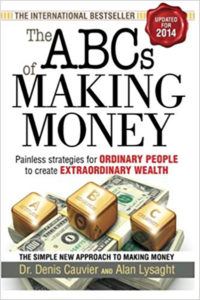
I started investing in trust deeds and notes and became a bank. I was doing that with my retirement funds as well as my personal funds. It’s a great way to invest. It’s a great way to diversify. On my personal side, what I noticed is that over the years, my interest income is growing. Every year I will get 1099 from the servicer. 1099 reports your interest and that simply adds income to my bottom line and that increases my taxes. I remember owning a bunch of rental properties and how much deductions I had. I wanted to change that. That’s when I started researching syndications. I knew someone from many years ago that I reconnected and he’s been very successful with that.
I invested my first syndication with him and then done a few more. The beauty of investing in syndication is it comes with the tax benefits. You get the depreciation and all the additional things. I remember making my first investments syndication at the tail end of 2018 in December, in the last few days. There was pretty much no income because of the timing. I received 1099 because it was for the last year. I received 1099 with the reported income of $1 and the tax deductions were about $12,000 or $15,000 just on that one syndication. That helped my bottom line. I’ve done some other ones since then. It’s a great way to help with your tax planning.
As far as the 401(k) and having checkbook control, what’s the hardest part of that process? Maybe for the client or for you and doing this business as well.
What you mentioned is get to know where that step is making that decision. I’ve seen clients who lose on deals when they didn’t do the proper steps. They try to get the deal first and then converting the retirement funds into a source that they can use for that deal. It’s making that decision. You need to ask yourself, “Do you want to give control of your money to somebody else, to your stockbroker?” Even if you invest yourself, you don’t have a lot of control. You might have certain control as far as implementing certain strategies in the stock market, but ultimately, we don’t have control. If you want to stay there, that’s fine. You can continue to do that. If you want to be in control or if you want to have more control, then you’ve got to make that decision. Make that conversion and then start looking for investment opportunities. I don’t think that’s a good excuse, not being able to find the deal. I get that once in a while from clients.
Is there a specific amount that you have to have to be able to convert?
Not really. I started this business helping clients with the IRAs. Most of my clients bring $50,000, $100,000, $200,000, $500,000 from other retirement accounts. When we added Solo 401(k) to our services, quite often I have clients who start from zero. They don’t have any retirement accounts but they have a successful business, because of the high contribution limit, husband and wife together can contribute well over $100,000 in a single year. That’s your seed money. You can do quite a bit of that. You can do a couple of syndications with that.
[bctt tweet=”If you’re in debt, then you’re working for somebody else just to pay and making somebody else wealthy.” via=”no”]
Is there a way that you’ve improved your business that we could apply to ours?
One of the things is being able to delegate. I like to be in control and I tend to do things myself. It took me a while, but it’s a good example to share with anybody, regardless whether you’re a business owner or you’re an investor. Whatever it is that you’re doing, you need to delegate. You need to focus on what you do the best and delegate other things. You might do them the best, but certain things don’t have to be done the best way. They need to be delegated and that will improve your bottom line.
Done is better than perfect. What’s the number one thing that’s contributed to your success?
I’ve had some failures. I’ve done some different things I invested in business-wise. I think its perseverance. I’ve done those things and even in this business, I had some struggles in the beginning, but because I did not quit and I applied the experience I learned in the past, it definitely helped me succeed.
How do you like to give back?
There are some things that we support. One of the things is that I’m fully passionate about and I think we shared that is we support some orphans. There is an organization in Ukraine that works with orphans. We support them. We also work with several organizations that support children in third world countries. We have three girls that we support through that organization as well.
Thank you for sharing that. I appreciate you doing that as well. How highly you’re passionate about helping families adopt. I am grateful for your time and being on the show and the expertise you’ve shared in many different levels about 401(k), checkbook control, and why that’s important, who can use it and who can’t. Tell the audience how they can get in touch with you.
Anybody can find me on Facebook and LinkedIn. I’m on Twitter as well. Probably the best way is to go to our website, SenseFinancial.com. That’s how the name came is financial concepts that make sense. That’s what we are talking about. They’re common sense things.
Dmitriy, thank you so much. I wish it was common sense, but we have to study this stuff. We appreciate we have somebody like you that can help us out. I appreciate the audience being with us every day. I hope you’re learning a lot from the show and your business is growing because of it. Please go to Life Bridge Capital and connect with me. I’d love to get on a call with you. Go to our contact page and I’ll help you in any way I can. Go to the Facebook group, The Real Estate Syndication Show, and we will talk to each of you soon.
Important Links:
- Dmitriy Fomichenko
- Sense Financial Services LLC
- The ABCs of Making Money
- Facebook – Dmitriy Fomichenko
- LinkedIn – Dmitriy Fomichenko
- Twitter – Dmitriy Fomichenko
- SenseFinancial.com
- Contact page – Life Bridge Capital
- The Real Estate Syndication Show – Facebook
About Dmitriy Fomichenko

Sense Financial Services was inspired by a series of conversations Dmitriy had with his mentors in the real estate investor business. While many were exceedingly successful in their real estate investments, their retirement accounts were losing money. This conundrum prompted Dmitriy to spend several months consulting with industry experts and researching the powerful concept of employing self-directed retirement accounts for investment purposes. Integrating his knowledge of how to successfully manage self-directed IRAs and 401ks with his expertise as an investor and mentor, Dmitriy began consulting individual investors on how to put more thought and diligence into their retirement and investment planning.
Dmitriy founded Sense Financial Services to help his clients maximize their returns on investments while protecting their hard-earned money. He is very passionate about helping families and individuals achieve financial freedom by following proven Biblical principles of financial planning and investing.
Dmitriy resides in Southern California with his wife and 9-year old daughter. In his spare time, he enjoys studying systematic theology, spending time with his family and visiting new places.
Love the show? Subscribe, rate, review, and share!
Join the Real Estate Syndication Show Community:

